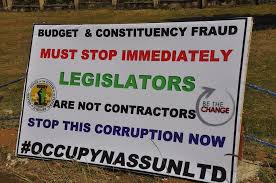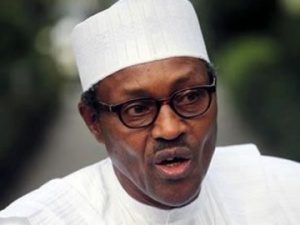
Suggestive messages

Crowd at a previous protest at the Nigerian NASS

Previously, the Nigeria Police disallowed the BBOGs seeking audience with the president in the Villa

President Buhari, Grand Commander of the Anti-Corruption war in Nigeria
Might the Buhari regime finally be on to constructing a pact around its anti-corruption war? This is the question being asked in the wake of the rise of a virtual anti-corruption movement that has climaxed in a rudimentary ‘occupy movement’ starting with the entrance to the National Assembly. It has potentials to engulf the elite and the moment some of the elite such as former President Obasanjo have warned against by drawing on what happened in Egypt might as well be arriving. Activists of the occupiers are starting with a demand for downward review of salaries and benefits paid to politicians by 70% but they are equally canvassing death sentence for public officials convicted for stealing of public funds. As one of them was quoted as saying, “Occupy NASS is a protest against corruption, political criminality, and a long period of bad leadership”. It is very unlikely that such a crowd would have been allowed to remain there for the third day running if they were against the anti-corruption war.
From far away in Morocco, the president who is attending COPP22 has been reported as telling John Kerry, out going US Secretary of State that corruption is already fighting back in many ways. He has expressed that view before.
The surge of the occupy movement politics was preceded by a steady expansion of the army of solidarisers or people plugging into the anti corruption war. To cite but a few: The Northern Christian Leaders who visited the president very recently were reported, among others, to have pledged support for the anti-corruption war. During celebrations marking his 10th anniversary on the throne, the Sultan made his stand categorically clear. He characteristically went as far as recalling what the Prophet would have called people who are found to be corrupt going by what the Prophet had called such people before. Speaking a few days ago, the President of Christian Association of Nigeria, (CAN) endorsed the war without reservations. And then the acting Chief Justice of Nigeria, Justice Walter Onnoghen entered the office with a commitment to make the judiciary a theatre of the war against corruption.
As many of these key players cannot have been bought or coerced to say what they said, it can be assumed that the government must have seen the light in pacting an anti-corruption movement which would take the matter of legalism to the arena of popular judgment. In Africa, law cannot resolve the crisis of corruption because corruption is not a moral issue but a statement in power relationship. In other words, the regime might have advanced beyond its infatuation with its self-righteous sabre rattling and townhall level of mobilisation.
But observers note that occupy movement politics is the politics of The Multitude and too characterised by the problems of spontaneity too even as spontaneity is the source of its advantages as an approach in popular struggle. But anything in Nigeria can always produce a different outcome. This one too could. It all speaks to Lenin’s logic that politics is the husband of economics. He could have equally said that politics is the husband of everything!




























